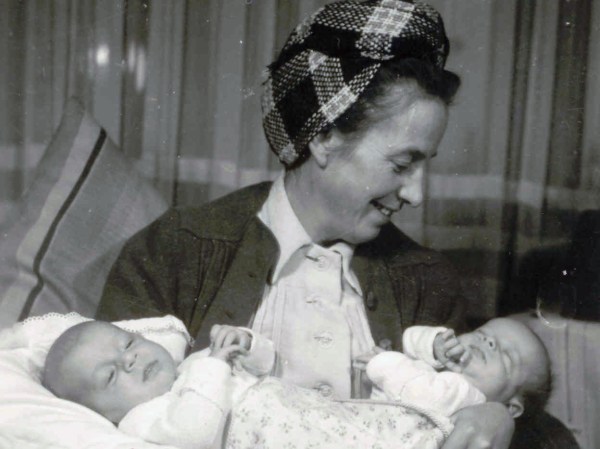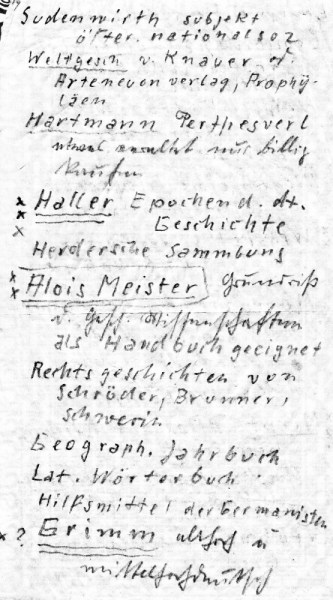POWs on Starvation Diet
Papa compared the US camp administration with the Sphinx of Ancient Egypt. The secrecy about the political development in their respective home provinces was a riddle to which there was no answer. With its heavily censored articles, the camp newspaper ‘Wahrheit’ (Truth) offered very little information and even less ground for an early dismissal. One thing Papa was able to figure out, though. The Russians had taken over Thuringia and Saxony and had become the master over his hometown Gotha. Whether his wife and children had been able to survive the war, he did not know. He repeatedly expressed his worry and concern over their safety.

Among the captured officers, many intellectuals, professors from various disciplines were taken out of their university. They served in the army in a commanding position. To fight boredom and help their colleagues get their minds off the common misery, they offered lectures on their expert knowledge of their particular field of research. These open-air sessions were top-rated and offered a broad range of topics, interpreting operas, 5000 years of Ancient Egypt, understanding Goethe’s Faust, to name a few. Through conversation with some of these impressive presenters, Papa hit on the idea of jotting down all the books, which they recommended for further study and which he was eager to read to feed his idea-hungry intellect. A glance at the list gave me deep insight into Papa’s enquiring mind, and I could not help admiring his fascination for history. Later on, after his release, he began to acquire these books, primarily historical and devoured them at a rapid pace. He went through an entire set of over 20 volumes on world history written by world-renowned historian Leopold von Ranke.

Unfortunately, from week to week, the food situation was getting worse. One day their thin, sugary breakfast soup arrived only at one o’clock in the afternoon. Even the most exciting talk about ancient history could not detract from the fact that the POWs at the Bad Kreuznach Camp were starving and growing weaker every day. Papa noticed the absence of mice, which was highly unusual considering so many men concentrated in such a small area. He concluded that in the most humble household, there was always some food left in the pantry. Here at the camp, with thousands of men milling about in constant search for food around the camp kitchen or some mouldy scraps from the garbage cans, nothing was edible left that might attract even a hungry rodent.
The human mind is incredible and the use of the imagination is always used. Prisoners across the world during and after World War II had voice orchestras, wrote down Bible verses and other pursuits. The mice that had been in the camp were probably eaten. Starvation is a hard thing but the mind still works!
LikeLiked by 2 people
Das mit den Nagetieren ist schon ein erheblicher Hinweis! Sonst suchen sie ja die Nähe zu Menschen auf, aber da verschmähten sie sie sogar.
LikeLike
To me that sounds as if the prisoners were systematically starved. What about that war crime?
The Russians set themselves up as harsh judges through the Nürnberg trials, but how many people did crazy Stalin have killed? And the Russians killed and starved to death millions of people in Ukraine during the war. Nobody talks about that. I don’t want to excuse what the Nazis did, but people, who do the same, have no right to judge, they are on the same level as the criminals.
LikeLiked by 1 person
The second last post of chapter 5 will throw some additional light on the plight of the German POWs in the Rheinwiesen Camps between April and September 1945. I am merely reporting the experiences that my late father-in-law wrote down on these tiny pieces of paper. Apart from describing his personal experiences, his notes are also a historical record.
LikeLiked by 1 person
Yes they are definitely a historical record, and it is good that they are shown here on your blog.
LikeLiked by 1 person
My comment was directed at Stella, who was making some equivalence between the experiences your father-in-law had and the ones experienced in the Nazi concentration camps. Your reporting of what happened to your father-in-law is itself terrible, and I was not in any way suggesting otherwise.
LikeLiked by 1 person
From the little I’ve read food shortages in Germany after World War II, the problem was nation-wide. There were severe food shortages all over Germany, and the occupying forces were not trying to starve the prisoners—there just wasn’t enough food. To compare this to what the Germans did in the concentration camps—murdering people by the millions and torturing and mutilating others—as the previous commenter suggests, is, in my opinion, an obscene comparison.
I am not suggesting that these men didn’t suffer. I think it’s awful that anyone has to suffer food deprivation. But the occupying forces were not trying to kill them.
Wikipedia has a short article about the food shortages throughout Germany, including this paragraph:
“Once the occupation of Germany commenced, it proved impossible to deliver the intended levels of food. The Allied planners underestimated the extent of the damage to German infrastructure, and overestimated the ability of Germans to grow their own food. As a result, once supplies which had been stockpiled by the German government during the war ran out, the ration scales were reduced to 4,200–5,200 kJ (1,000–1,250 kcal) per day. Most German civilians were able to supplement these rations, however. Displaced persons, including Holocaust survivors, were allocated more generous rations. These averaged only between 6,700 and 8,400 kJ (1,600 and 2,000 kcal) per day, and few of the displaced persons were able to access other sources of food.”
There is also this article: https://histclo.com/essay/war/ww2/after/ger/occ/west/ow-food.html
LikeLike
It would be horrible to go month after month not knowing if your family had survived.
LikeLiked by 1 person
Remarkable motivation to be able to focus on learning under such circumstances.
And a great, though unfortunate, analogy of connecting the absence of mice to the lack of food.
LikeLiked by 1 person